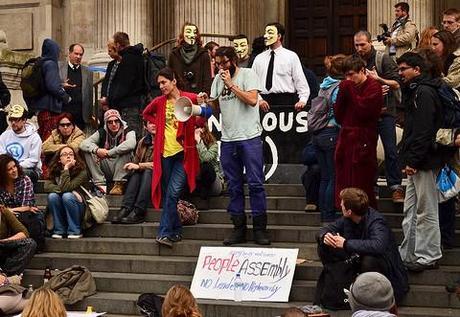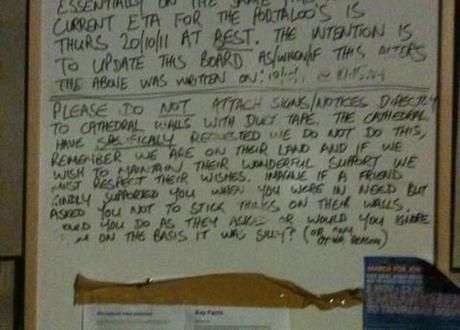
Occupy London. Photocredit: Garryknight http://www.flickr.com/photos/garryknight/6260120281/sizes/m/in/photostream/
The Occupy London (as it now seems to be called after their failure to Occupy London Stock Exchange) protests have entered their sixth day. Will they continue? Or will they fizzle out? At least they’ve now drawn up a list of demands — available on their website here, including the phrase “we need alternatives.”
‘Muddy’ demands There is a “tent city”, said The Economist’s Leviathan column, by the side of St Paul’s. Placards bristle, reading “Capitalism is Crisis”; another offers “free hugs.” The Church doesn’t mind (so far). There are fears that the city will become “semi-permanent” — and they won’t leave till they get what they want. But their demands remain “muddy.” They want banks to be got rid of; more empathy; they’re against “heartless capitalism.” How long will it take for them to educate people to waking up to “the truth about the banks”? Well, the answer is “blowing in the wind.”
“We’re not going to create the answer here, but we can effect a change by leading by example, by showing people that an autonomous, democratic community based on social rather than financial cooperation can work”, said Bear, who runs the Occupy London kitchens, quoted in The Guardian.
Tent camp as model for an alternative society. But they’re not going to leave, said Patrick Kingsley in a nuanced and intelligent piece on The Guardian. It’s growing fast — there’s about 200 tents now. It has a kitchen, and portaloos, and recycling bins. They do have an aim — “dialogue.” They all reject capitalism, but have no solutions — “If anything, the camp itself is their demand, and their solution”, a stab in the dark at an “alternative society” without a hierarchy and with full democracy. And “it kind of works.” Kind of — there are problems with lack of hierarchy, as “facillitators” (not leaders) find themselves increasingly seen as “organisers.” But still, at least they are causing questions to be asked.

What's really bugging the protestors. Photocredit: PAW
Strange little Eden. Is it the “squeezed middle”, asked Iain Hollingshead in a well-written and well-balanced article on The Daily Telegraph, rather than the “usual rentamob of Swampy lookalikes?” They’re certainly switched on, with a “media tent, a recycling zone, a library” amongst other things. There’s no booze, and they seem to be drawing support “from a much wider demographic” than usual. But who they actually are is harder to guage. Hollingshead met someone who’d been on Britain’s Got Talent, as well as someone who called himself “God.” The Anonymous UK online hacktivist collective has a presence in St Paul’s. There are others sporting genuine concerns: people who can’t get funding, people who don’t like the greed of the bankers. But many can’t even articulate what they want: this is “a generalised squeal of pain” rather than “a campaign with an achievable goal.” Their list of goals is “hardly the Arab Spring” — simply a “banal wish list.” The hardcore of protestors is dwindling — so will it (to quote T.S. Eliot) “end with a bang” or “a whimper” — and, more importantly, when will the Cathedral flex its muscles and cast the protestors “out of this strange little Eden”?
Occupy Wall Street might soon need to Occupy itself. Well, said Adam Martin on The Atlantic Wire, the initial Occupy Wall Street camp is now turning into “something resembling a governed society.” The general assembly is now replaced by a “spokescouncil” model — and questions are being raised about money, with a drumming circle effectively being taxed on their profits. “ ‘We’re like, what’s going on here? They’re like the banks we’re protesting”, said a member of the drumming group.

